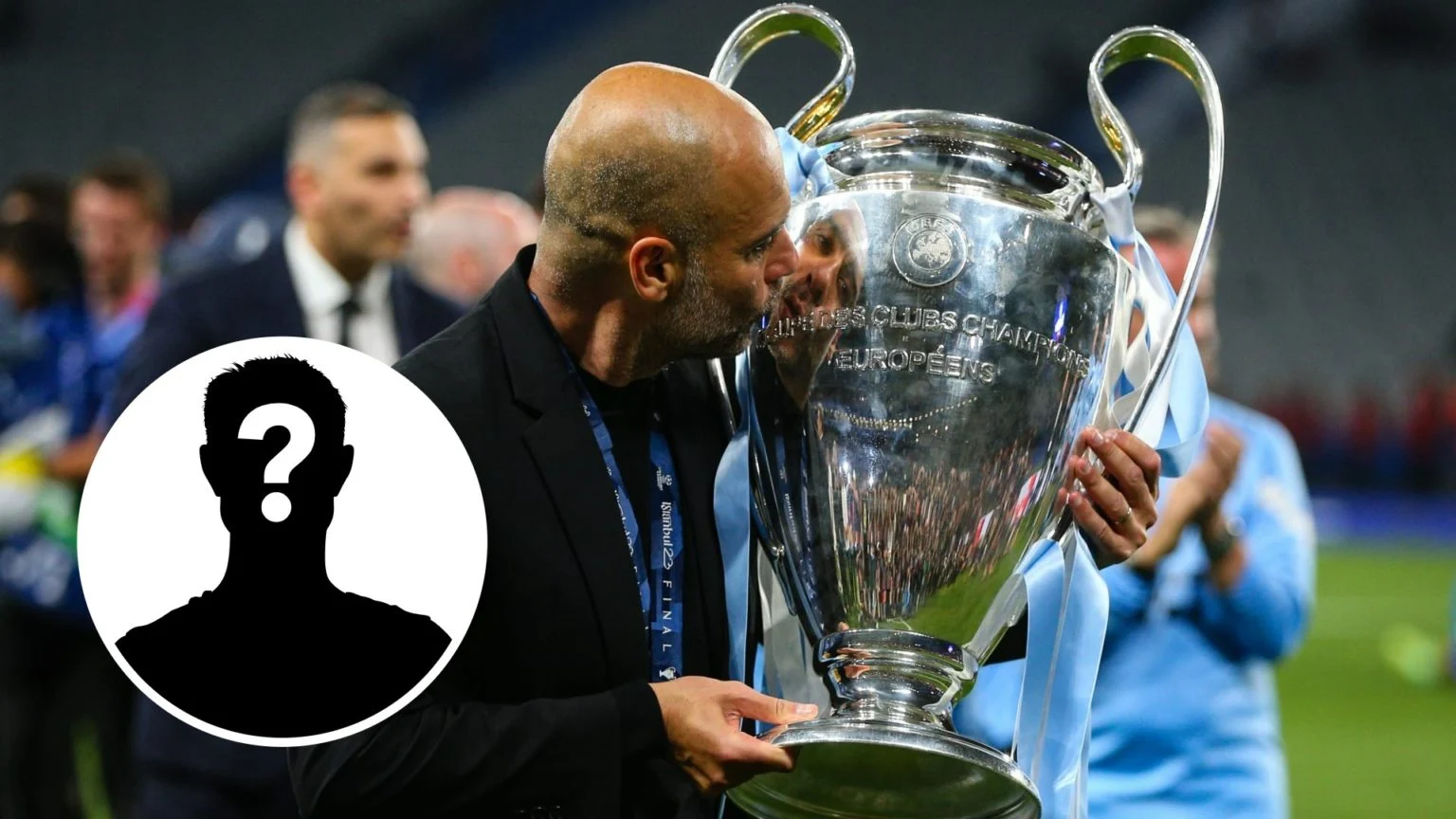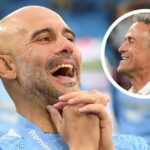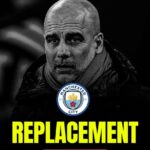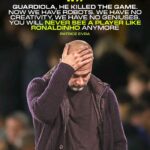Pep Guardiola’s replacement has been staring Manchester City right in the face in recent months

Manchester City supporters exist in a perpetual state of wanting time to stand still. Since Pep Guardiola’s arrival at the Etihad Stadium in 2016, the club has transformed from Premier League contenders into a footballing juggernaut that has redefined success in English football. The Catalan mastermind has orchestrated an unprecedented period of dominance that has seen City claim every available trophy, establishing new benchmarks for excellence that future generations will struggle to match.
The magnitude of Guardiola’s achievements at Manchester City cannot be overstated. His revolutionary approach to the game has produced moments of footballing artistry that transcend sport itself. The historic 100-point season demonstrated tactical perfection on an unprecedented scale, while the treble triumph showcased the complete domination possible when tactical genius meets exceptional talent. These achievements have cemented Guardiola’s status as arguably the greatest coach to ever grace the Premier League.
Under Guardiola’s guidance, Manchester City has evolved from a wealthy club with ambitions to a footballing institution that sets global standards. His influence extends beyond trophies and statistics; he has fundamentally altered how football is played, coached, and understood. The positional play, the intricate passing patterns, and the relentless pressing have become synonymous with modern football excellence, creating a template that clubs worldwide attempt to emulate.
The transformation of individual players under Guardiola’s tutelage represents another dimension of his genius. From converting midfielders into full-backs to turning defenders into playmakers, his ability to maximize human potential while maintaining tactical cohesion has become legendary. This developmental approach has created a squad capable of adapting to any tactical challenge while maintaining the core principles that define Manchester City’s identity.
The Impossible Task of Succession
The challenge facing Manchester City’s hierarchy extends far beyond identifying a competent replacement for Guardiola. The club must find someone capable of maintaining the astronomical standards established during his tenure while possessing the tactical acumen to continue evolving the team’s approach. This represents one of the most daunting succession challenges in modern football, comparable to replacing legendary figures like Sir Alex Ferguson or Vince Lombardi.
The incoming manager will inherit a squad accustomed to tactical sophistication and technical excellence. Players who have spent years perfecting intricate positional play and complex tactical movements will expect their new coach to maintain similar levels of innovation and strategic thinking. This expectation creates immediate pressure to demonstrate tactical credibility while avoiding the disruption that often accompanies major transitions.
Financial considerations add another layer of complexity to the succession planning. Guardiola’s success has been built on significant investment in players who fit his specific tactical requirements. The next manager must either adapt to these existing personnel or convince the hierarchy to invest in new players suited to their tactical philosophy. This balance between continuity and innovation will define the success or failure of Guardiola’s successor.
The global expectations surrounding Manchester City’s continued success create additional pressure for the incoming manager. Supporters, media, and football observers worldwide will scrutinize every decision, comparing performances to the Guardiola era. This microscope effect means that even temporary setbacks or tactical adjustments may be magnified into crises, requiring exceptional mental resilience and communication skills.
Luis Enrique: The Logical Successor
Luis Enrique emerges as the most compelling candidate to succeed Guardiola at Manchester City, representing a perfect convergence of tactical understanding, proven success, and philosophical alignment. His recent triumph with Paris Saint-Germain, delivering their first Champions League title while completing a treble, demonstrates his ability to manage elite players and compete across multiple competitions simultaneously.
The Spanish coach’s Barcelona background provides crucial insight into his tactical DNA and philosophical approach. Having emerged from the same coaching education system as Guardiola, Enrique understands the fundamental principles of positional play, pressing triggers, and tactical flexibility that define modern football excellence. This shared foundation would facilitate a smoother transition than appointing a coach from a different tactical school.
Enrique’s experience at Barcelona following Guardiola’s departure offers a unique precedent for this potential succession. His ability to work with players who had been shaped by Guardiola’s methods while implementing his own tactical variations proved that continuity and innovation could coexist. This historical precedent suggests that a similar transition at Manchester City could maintain competitive standards while allowing for tactical evolution.
The timing of Enrique’s PSG contract expiration in 2027 aligns perfectly with Guardiola’s expected departure from Manchester City. This synchronization provides both clubs with adequate time to plan their respective transitions while avoiding the complications that arise from attempting to extract managers from existing contracts. The natural timeline allows for proper succession planning without the disruption typically associated with mid-contract negotiations.
Tactical Philosophy and Adaptation
While Enrique and Guardiola share fundamental tactical principles, their approaches diverge in significant ways that could benefit Manchester City’s evolution. Enrique’s PSG team demonstrated a more direct style of play that maintained possession-based principles while incorporating greater verticality and pace in attacking transitions. This tactical flexibility could provide Manchester City with new dimensions to their attacking approach.
The adaptability Enrique has shown throughout his career suggests he could successfully integrate his tactical preferences with Manchester City’s existing playing style. His willingness to modify his approach based on available personnel and competitive requirements indicates the flexibility necessary to manage a squad that has been molded by Guardiola’s specific methods.
Enrique’s experience managing world-class players at both Barcelona and PSG provides valuable preparation for the Manchester City role. His ability to maintain harmony among elite personalities while demanding tactical discipline demonstrates the leadership qualities necessary to succeed at the highest level. This experience managing superstar players would prove invaluable in maintaining squad cohesion during the transition period.
The evolution of Enrique’s tactical approach from his Barcelona days to his PSG tenure shows his capacity for growth and adaptation. His willingness to incorporate new ideas while maintaining core principles suggests that Manchester City’s tactical evolution could continue under his guidance, preventing the stagnation that sometimes accompanies coaching changes.
The Barcelona Connection and Historical Precedent
The shared Barcelona heritage between Guardiola and Enrique extends beyond tactical philosophy to encompass a deeper understanding of football culture and player development. Both coaches experienced the legendary La Masia system as players and coaches, absorbing the principles of total football and tactical innovation that would later define their careers.
Enrique’s successful transition at Barcelona following Guardiola’s departure provides a compelling template for a similar move at Manchester City. His ability to maintain Barcelona’s tactical identity while introducing his own innovations resulted in continued success, including Champions League triumph and domestic dominance. This historical precedent suggests that tactical continuity need not require tactical stagnation.
The relationships and networks developed through Barcelona connections could facilitate Enrique’s integration into Manchester City’s structure. His understanding of the personalities and dynamics that define elite football clubs would help him navigate the complex relationships that determine coaching success at the highest level.
The cultural similarities between Barcelona and Manchester City’s current approach to football create additional compatibility. Both clubs prioritize technical excellence, tactical innovation, and player development, suggesting that Enrique’s values and methods would align naturally with Manchester City’s institutional culture.
Mikel Arteta: The Alternative Vision
Mikel Arteta represents a fascinating alternative to Luis Enrique, offering a different perspective on potential succession at Manchester City. His transformation of Arsenal from underachievers to title contenders demonstrates his tactical acumen and ability to implement long-term vision effectively. The November reports suggesting City’s interest in Arteta reflect recognition of his exceptional work in North London.
Arteta’s direct experience working under Guardiola at Manchester City provides unique insights into the club’s culture, tactical methods, and operational procedures. His time as assistant coach allowed him to observe Guardiola’s methods firsthand while developing his own tactical philosophy. This insider knowledge could prove invaluable in maintaining continuity during the transition period.
The tactical innovation Arteta has displayed at Arsenal suggests he possesses the creativity and strategic thinking necessary to succeed at Manchester City. His ability to develop young players while maintaining competitive standards demonstrates the developmental approach that aligns with City’s long-term vision. His success in creating tactical systems that maximize player potential reflects the kind of thinking that Guardiola has embodied.
However, Arteta’s Arsenal connection creates obvious complications for any potential move to Manchester City. The rivalry between the clubs and the loyalty expectations from Arsenal supporters would make such a transition controversial and potentially disruptive. The emotional and practical challenges of crossing this divide might outweigh the tactical benefits of his appointment.
The Succession Timeline and Strategic Planning
The reported timeline for Guardiola’s departure at the end of the 2026-27 season provides Manchester City with a crucial advantage in succession planning. This advance notice allows for comprehensive evaluation of potential candidates while avoiding the rushed decisions that often characterize emergency appointments. The club can conduct thorough due diligence while maintaining stability in their current operations.
The synchronization between Guardiola’s departure and Enrique’s contract expiration creates a natural window for transition that benefits all parties involved. PSG would have time to identify their own succession plans while Manchester City could conduct negotiations without the complications of compensation payments or contract disputes. This alignment represents ideal circumstances for a major coaching transition.
The importance of early action in securing Enrique’s services cannot be overstated. PSG’s recent success under his guidance will naturally lead to extension discussions, potentially complicating City’s pursuit if they delay their approach. The competitive nature of elite coaching appointments means that decisive action may be necessary to secure preferred candidates.
The potential for other elite clubs to pursue Enrique adds urgency to Manchester City’s succession planning. His proven ability to deliver Champions League success makes him an attractive candidate for any club with European ambitions. City’s advantage lies in their tactical compatibility and the natural progression his career could take at the Etihad Stadium.
Managing the Transition Period
The transition from Guardiola to his successor will require careful management to maintain competitive standards while allowing for tactical evolution. The new coach must demonstrate respect for Guardiola’s achievements while establishing their own authority and tactical identity. This balance between continuity and change will determine the success of the transition period.
Player management during the transition will prove crucial to maintaining squad harmony and performance levels. The incoming coach must convince established stars to embrace new methods while maintaining the confidence and motivation that has driven their previous success. This psychological aspect of coaching transitions often determines their ultimate success or failure.
The media and public expectations during the transition will create additional pressure that must be managed carefully. The new coach will face immediate comparisons to Guardiola’s achievements while being expected to maintain City’s winning culture. Communication strategies and realistic expectation setting will be essential to navigating this challenging period.
The importance of maintaining Manchester City’s developmental culture during the transition cannot be overstated. The club’s commitment to youth development and player improvement has been a cornerstone of their success. The new coach must demonstrate similar commitment to these values while implementing their own tactical and strategic vision.
Global Football Context and Competition
The appointment of Guardiola’s successor at Manchester City will reverberate throughout global football, influencing tactical trends and coaching appointments at other elite clubs. The success or failure of this transition will be studied by football observers worldwide, creating additional pressure while providing opportunities for innovation and leadership.
The competitive landscape in European football continues to evolve, with new tactical approaches and strategic innovations emerging regularly. Guardiola’s successor must be capable of adapting to these changes while maintaining Manchester City’s position at the forefront of football development. This requirement for continuous innovation adds complexity to the succession decision.
The financial implications of the coaching transition extend beyond the immediate costs of appointment. The new coach’s ability to maintain competitive success will influence player retention, recruitment capabilities, and commercial opportunities. The economic stakes surrounding this decision add another dimension to the selection process.
The influence of Manchester City’s coaching appointment on broader football culture cannot be ignored. The club’s tactical innovations under Guardiola have influenced coaching approaches worldwide. The continuation of this intellectual leadership in football will depend partly on the wisdom of the succession decision.
Conclusion: Preparing for the Future
The eventual succession of Pep Guardiola at Manchester City represents one of the most significant coaching transitions in modern football history. The club’s ability to maintain their competitive excellence while evolving tactically will depend on careful planning, strategic thinking, and decisive action when opportunities arise.
Luis Enrique’s combination of tactical sophistication, proven success, and philosophical alignment makes him the ideal candidate to succeed Guardiola. His experience managing elite players, delivering Champions League success, and adapting tactical approaches to different contexts provides the foundation for continued success at Manchester City.
The synchronization of contractual timelines and tactical compatibility creates a unique opportunity for a seamless transition that could maintain City’s competitive standards while allowing for tactical evolution. The key to success lies in recognizing this opportunity and acting decisively to secure Enrique’s services before other factors complicate the situation.
Manchester City’s future depends not only on identifying the right successor but also on managing the transition process effectively. The club’s commitment to excellence, tactical innovation, and player development must continue regardless of who occupies the manager’s office. The ultimate measure of success will be the continuation of the winning culture that Guardiola has established.
The legacy of the Guardiola era at Manchester City will be defined not only by the trophies won and records broken but also by the foundation established for future success. The wisdom of the succession decision will determine whether this remarkable period represents a peak or a launching pad for even greater achievements. The choice of Luis Enrique as successor offers the best opportunity to ensure that Manchester City’s golden age continues well into the future.















